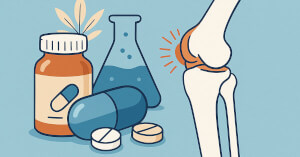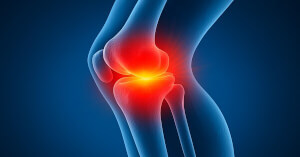
What Supplements Can Help with a Frozen Shoulder (Adhesive Capsulitis)?

Frozen shoulder, also known as adhesive capsulitis, is a painful condition where the shoulder joint becomes stiff and loses its range of motion. It happens when the capsule of connective tissue that surrounds the shoulder joint thickens and tightens, forming bands of fibrous tissue that restrict movement.
This can make even simple tasks, like reaching overhead or behind your back, difficult and painful. Many people also find it nearly impossible to sleep comfortably, as the shoulder pain often worsens at night and limits resting positions.
The exact reasons why some people develop a frozen shoulder are still not fully understood. It can occur after an injury or surgery, but often appears without a clear cause. Women are more frequently affected than men, and people with diabetes are up to twice as likely to suffer from frozen shoulder, suggesting a link between metabolic or hormonal factors and the condition.
The condition often develops gradually and passes through three stages: freezing (painful stage), frozen (stiffness stage), and thawing (recovery stage). Recovery is slow and can take anywhere from one to three years, depending on the severity and how early treatment begins. A combination of physiotherapy, anti-inflammatory treatments, and targeted supplements may help speed up healing and restore mobility.
How Supplements Can Support Recovery
Physiotherapy remains the cornerstone of frozen shoulder treatment. Regular stretching and guided exercises help maintain mobility and prevent the joint from locking further. In some cases, doctors prescribe corticosteroid injections such as cortisone to reduce pain and inflammation during the acute phase.
Supplements do not replace medical care, but they can complement it by addressing underlying inflammation, improving circulation, and supporting the breakdown of fibrotic tissue. When used alongside physiotherapy, certain nutrients and enzymes may help the body heal faster, improve range of motion, and speed up overall recovery.
Best Supplements for Frozen Shoulder Recovery
1. Serrapeptase
Serrapeptase is a proteolytic enzyme originally discovered in the digestive tract of silkworms. It helps the body break down dead or damaged proteins, including fibrotic tissue that can form around the shoulder capsule. By reducing this excess tissue, Serrapeptase may help restore shoulder mobility and relieve chronic pain.
In some clinical observations, Serrapeptase has shown promise in reducing inflammation and improving joint stiffness. It appears to be most effective when taken during the initial “freezing” stage, when inflammation and fibrotic tissue formation begin. However, it may also provide benefits in later stages by helping to break down existing scar tissue and supporting better shoulder mobility over time.
✔️ Typical Dosage Range: 40,000 to 120,000 units per day, taken on an empty stomach. Start low and increase gradually during the active phase.
2. Devil's Claw
Devil's claw (Harpagophytum procumbens) is a traditional herbal extract known for its anti-inflammatory and analgesic properties. It can help ease pain and improve function in musculoskeletal conditions, including frozen shoulder, without the gastrointestinal side effects of NSAIDs.
Several studies have shown that devil's claw can reduce stiffness and pain in people with chronic inflammatory joint problems. Its main compounds, harpagosides, act on the same biochemical pathways involved in inflammation and tissue pain signaling.
✔️ Typical Dosage Range: 300 to 600 mg of standardized extract (2–3% harpagoside) once or twice daily.
3. Curcumin
Curcumin, the main active compound in turmeric, helps control inflammation by modulating cytokines and enzymes that trigger pain and swelling. It can reduce the inflammatory response inside the joint capsule, making physiotherapy exercises more effective.
In a clinical study from 2021, participants taking 1 gram of curcumin daily experienced reduced shoulder pain and better joint mobility compared with those who did not supplement. Pairing curcumin with black pepper extract (piperine) significantly improves absorption.
✔️ Typical Dosage Range: 500 mg to 1,000 mg per day of curcumin standardized to 95%, with piperine for absorption.
4. Omega-3 Fatty Acids (Fish Oil)
Omega-3 fatty acids from fish oil (EPA and DHA) help regulate inflammation throughout the body. For people with frozen shoulder, they may reduce joint inflammation and improve overall flexibility. Omega-3s also support better blood flow to soft tissues, which helps healing.
Studies show that regular omega-3 intake can lower levels of inflammatory molecules like prostaglandins and cytokines. This effect may lead to less morning stiffness and reduced shoulder discomfort.
✔️ Typical Dosage Range: 1,000 to 3,000 mg of combined EPA and DHA daily, taken with food.
5. Magnesium
Magnesium plays a role in muscle relaxation, nerve transmission, and inflammation control. Low magnesium levels can increase muscle tightness and limit mobility in frozen shoulder. Supplementing may help muscles around the shoulder relax and reduce painful spasms.
Among available forms, magnesium glycinate and magnesium malate are better absorbed and easier on the stomach than oxide forms.
✔️ Typical Dosage Range: 200 to 400 mg of elemental magnesium daily, preferably in the evening.
6. MSM
MSM provides sulfur, a key element for collagen and connective tissue. While it may not directly dissolve fibrotic tissue, it supports long-term joint health and reduces oxidative stress. Over time, MSM can help maintain shoulder flexibility and reduce recurrent stiffness.
It is often used alongside glucosamine or collagen peptides for better structural support.
✔️ Typical Dosage Range: 1,500 to 3,000 mg per day, divided into two doses with meals.
Lifestyle & Recovery Tips
- Continue physiotherapy or gentle mobility exercises daily to prevent further stiffness.
- Apply heat packs before stretching to loosen the capsule and improve blood flow.
- Consider intermittent fasting combined with spermidine supplements to stimulate autophagy, a natural process that helps the body clear damaged or fibrotic tissue.
- Maintain a balanced diet rich in protein and antioxidants to support tissue repair.
- Get enough rest and manage stress, as cortisol imbalances can slow recovery.
Bottom Line
Frozen shoulder recovery takes time, but the right approach can make a big difference. Physiotherapy and, when needed, corticosteroid injections remain essential. Supplements like serrapeptase, curcumin, and devil's claw may help reduce fibrotic tissue and inflammation, while omega-3s, magnesium, and MSM support long-term healing and flexibility. Combined with good nutrition and lifestyle habits, these tools can help restore shoulder mobility faster and more comfortably.
FAQs
What is the best supplement for frozen shoulder?
There isn’t one single supplement that cures frozen shoulder. Serrapeptase is often considered the most helpful because it may break down fibrotic tissue that limits movement. Curcumin can support inflammation control, omega-3 fatty acids modulate inflammatory pathways, and magnesium helps relax tight muscles. These options work best alongside physiotherapy and regular mobility work, which remain the core of treatment. Results vary by person, dose, and consistency, so start low, monitor how you feel, and speak with a clinician if you use medications or have chronic conditions.
Can serrapeptase really help a frozen shoulder?
Serrapeptase is a proteolytic enzyme that may help reduce inflammation and gradually dissolve scar-like tissue in the shoulder capsule. Many users report improved range of motion when taking 40,000 to 120,000 units daily on an empty stomach. It appears most helpful if started during the "freezing" stage, yet some people also notice benefits later by targeting existing fibrosis. Because serrapeptase can affect clotting, consult your doctor if you take blood thinners or plan surgery. Use it as an add-on to physiotherapy rather than a replacement.
How long does it take for a frozen shoulder to heal?
Recovery typically takes 1 to 3 years and moves through three phases: freezing, frozen, and thawing. Timelines vary based on severity, adherence to physiotherapy, and individual health factors. Gentle daily mobility work, heat before stretching, and targeted supplements may help reduce pain and support faster progress. Expect plateaus and slow gains, especially during the middle "frozen" stage. If pain is severe or sleep is consistently disrupted, talk with your clinician about short-term options like corticosteroid injections to calm inflammation so rehab is easier.
Does magnesium help with frozen shoulder pain?
Yes. Magnesium supports muscle relaxation, nerve signaling, and inflammation balance. Many people with shoulder stiffness find that magnesium glycinate or malate (200 to 400 mg elemental magnesium daily) reduces muscle guarding and nighttime discomfort, which can make stretching more tolerable. It is not a cure, but it can improve comfort and sleep quality while you work through your rehab plan. If you have kidney disease or take medications that affect magnesium, ask your clinician which form and dose are appropriate for you.
Can I take supplements instead of steroid injections for frozen shoulder?
Supplements can support recovery, but they do not replace corticosteroid injections when pain is severe. Steroid shots can provide short-term relief by reducing acute inflammation, which often makes physiotherapy easier. Supplements like serrapeptase, curcumin, omega-3s, and magnesium tend to work gradually and support long-term healing rather than immediate pain control. The best approach is usually combined: targeted rehab as the foundation, short-term medical interventions when needed, and evidence-informed supplements to help mobility and tissue recovery over time.
What foods or supplements should I avoid with a frozen shoulder?
Limit ultra-processed foods and excess sugar, which can promote inflammation and slow tissue repair. If you take blood thinners or have bleeding risks, speak with your doctor before using curcumin, high-dose omega-3s, or serrapeptase, since these can affect clotting. If you have gallbladder disease, discuss curcumin and fish oil first. People with kidney issues should be cautious with magnesium. Always review your full medication list with a clinician to avoid interactions, and re-evaluate doses if you plan surgery or dental procedures.
Can intermittent fasting help with frozen shoulder?
Intermittent fasting may support recovery indirectly. Periods without food can stimulate cellular housekeeping processes (autophagy), which help the body clear damaged proteins. Some people also use spermidine during fasting windows for additional autophagy support. While this is not a direct treatment, it can complement physiotherapy and an anti-inflammatory diet. If you have diabetes, are underweight, or take medications that require food, ask your clinician before starting fasting. Start conservatively, stay hydrated, and prioritize protein during eating windows to support tissue repair.
This article was originally published on Stackbb, your trusted source for science-based supplement guides.







